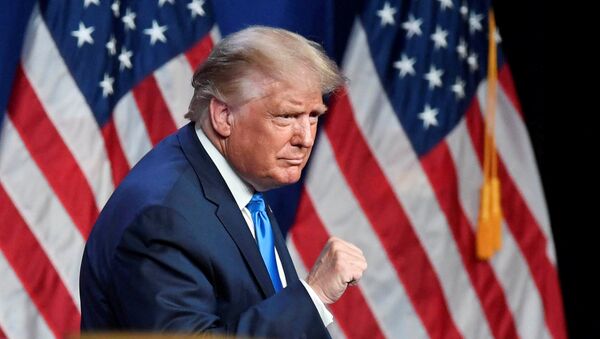Earlier in the day, the Republican Party opened its four-day national convention in Charlotte, North Carolina, during which Trump will be officially nominated. The Democratic Party officially nominated Joe Biden at their convention last week, in a largely virtual affair nominally held in Wisconsin.
"We feel very good about where we are in the South [...] I feel very confident where we are in Pennsylvania," Miller said in a Washington Post podcast. "We're in good shape in Michigan [...] As the economy recovers, that's a state that holds a lot of promise. Biden's spending a million a week on TV in Michigan so they know they're in trouble there."
Miller expressed his confidence, based on the most recent polling, about the president's position in North and South Carolina, Florida, Arizona, Iowa and Ohio. He offered that Biden must take Michigan, Pennsylvania and Wisconsin, whereas Trump will need only one win to secure the November election.
The adviser stated that Biden had failed to get what he described as a big bounce in the polls coming out of the Democratic national convention.
Miller also siad the Trump campaign has $185-190 million reserved for TV spending.
The Trump advisor said that the president would base his re-election campaign strategy over the next two months on completely eradicating COVID-19 and restoring the economy.
"Joe Biden wants to manage COVID. Donald Trump wants to eradicate COVID. It will be one of the top items in his second term agenda," Miller declared during a Washington Post podcast. "You're going to see the jobs message: President Trump is the jobs candidate. People trust him much more than Joe Biden for running the economy".
According to an average of the most recent surveys published on poll aggregator realclearpolitics.com (RCP), Biden is ahead in most major battleground states including Pennsylvania (+5%), Florida (+5%), Wisconsin (+6%), Michigan (6%), and Ohio (2%). Trump leads in North Carolina by under 1 percent and by 2% in Iowa. Nationally the RCP average has Biden ahead by 7%. National polls in the US are generally considered to be casual barometer of the race, primarily as the electoral college format requires the candidates to win states, not the overall popular vote.


